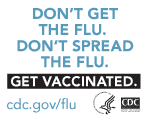CDC Features
Moving Outdoors
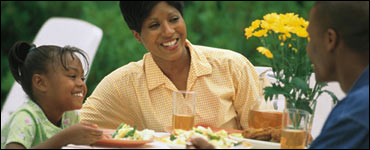
The return of warmer temperatures brings thoughts of freedom, relaxation, exploration, and being closer to nature. Whether you're relaxing in the backyard, turning up your garden, hitting the pool, or exploring the great outdoors, here are some ways to help keep you and your family healthy this spring and summer.
Beware of Bugs
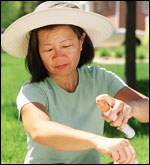
Warmer temperatures aren't just attractive to people. Mosquitoes, ticks, fleas, and other insects thrive in warmer weather, and they can transmit West Nile virus, Lyme disease, and other illnesses. Using insect repellent that works well, and applying it properly allows you to continue to play and work outdoors with a reduced risk of mosquito and tick bites. Young ticks are so small that they can be difficult to see, but both young and adult ticks hungrily look to animals and sometimes people to bite. To protect yourself from tick bites, avoid tick-infested areas (especially places with leaf-litter and high grasses), wear light-colored clothing so you can see ticks crawling on you, and use repellent containing DEET. You can also treat clothing with permethrin, which protects through several washings. Always follow the directions on repellent packaging! After you have been outside, check your body, your clothing, your children, and your pets for ticks. Here's how to check for ticks, remove them from your clothes, and how to remove them from skin safely once they've bitten… getting the whole tick, not just the body! Consult your healthcare provider if you become ill in the 1-3 weeks following a bite. It could be any number of illnesses.
Pesticides, vegetation-free play areas, and landscaping techniques for tick-free zones can also help limit your exposure to ticks and other insects.
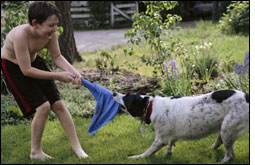
Healthy Pets, Healthy People
While you're outside enjoying the weather, remember to protect your pets too. Keeping your pets healthy helps to keep you and your family healthy. Children can get roundworm and hookworm from soil contaminated by pet feces (stool), so make sure that puppies and kittens are seen by a veterinarian and dewormed. Protect family pets from ticks and fleas by keeping them on a flea and tick control program.
Dining Al Fresco
Nothing says summer like the smoky flavor of foods cooked out on the grill. When you're grilling, use a meat thermometer to ensure that you cook meat and poultry thoroughly. Ground beef should be cooked to an internal temperature of 160°F. Also, put cooked meat on a clean platter, rather than back on the one that held the raw meat, to avoid cross-contamination. Whether you're cooking out in the backyard or on a picnic, always keep cold foods cold and hot foods hot. When you're finished eating, refrigerate leftovers promptly. For downloadable tips, see Safe Food Handling: Seven Super Steps to Safe Food In the Summer on our partner site, FightBAC.org.
Around the Yard
Now's the time to seal up, trap up, and clean up to prevent rodent infestation. As you're clearing out clutter, fill any gaps or holes inside and outside your home. Eliminate or seal rodent food sources such as pet food, bird feeders, and garbage cans. Elevate hay, woodpiles, and garbage cans at least 1 foot off the ground, and trim grass and shrubbery within 100 feet of your home.
In the yard, remove any items that may collect standing water, such as buckets, old tires, and toys. Mosquitoes can breed in them in just days. You can reduce the number of ticks around your home by removing leaf litter and brush- and woodpiles around your house and at the edge of your yard. By clearing trees and brush in your yard, you can reduce the likelihood that deer, rodents, and ticks will live there. Replace or repair torn window screens to keep bugs out of the house.
Gardening is a great outdoor activity for people of all ages. Stay safe and healthy as you grab your tools and head outside. Wear gloves, use safety gear when handling equipment and chemicals, protect yourself from the sun, and use insect repellent. Also watch out for heat stress and know your limitations.
Toxoplasma is a parasite that people can get from contaminated cat feces (stool). To a cat, a sandbox can look like a litter box, so keep it covered to protect your children from toxoplasmosis.
Outdoor pollens and air pollutants can be triggers for allergic reactions and asthma. Some experiences include nasal and sinus allergies and hives. Asthma can cause recurrent symptoms such as wheezing, chest tightness, shortness of breath and coughing. Stay healthy by properly taking any prescription or over-the-counter allergy medicine and having and following an asthma action plan. Wearing a protective nose and mouth mask, or even sunglasses or protective eyewear, while doing yard work could help to avoid the triggers that cause allergy and asthma complications.
Fun in the Sun
Protect yourself and your family from recreational water illnesses by doing your part to keep germs out of the pool. Do not swim when you have diarrhea, don't swallow pool water, take a shower before swimming, and wash your hands after using the toilet or changing diapers. Keeping germs out of the pool means a safer swim for everyone. Check the Healthy Swimming site's Swimmer Protection page for "How To's," including how to test your pool or spa at home using pool and spa test strips.
Play it safe in the sun. Avoid midday when the sun is intense, use sunscreen with at least SPF 15, cover up with clothing, wear a brimmed hat, and wear sunglasses that block UVA and UVB rays. Be aware of the signs of heat stress.
In the Great Outdoors
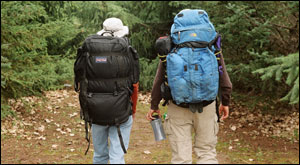
When you're out on the trail, whether hiking, camping, or hunting, protect yourself from mosquitoes and other bugs by using insect repellent. Wear long sleeves, long pants, and long socks when practical. Always check your clothes and body for ticks. If you find any ticks, carefully remove them with tweezers. The ticks that transmit Lyme disease are most active in May, June, and July, so be especially careful during those months. However, you need to look for ticks in all months of the year to protect yourself against other tickborne diseases.
Just because a mountain stream looks clear, it doesn't mean it's safe to drink. Giardia and Cryptosporidium are two parasites that you can't see, but they can make you very sick, so follow healthy swimming tips. Always treat or filter water to make it safe to drink. Ensure healthy boating and fishing experiences as well.
Bats are fun to watch as they flutter around at dusk. In many camp situations, the mere presence or sighting of bats is common and normal. Sometimes, bats may be infected with rabies and may pose a risk for exposure to humans. Remind children to never touch a bat. If you are bitten by a bat, wash the affected area thoroughly and get medical advice immediately. Whenever possible, the bat should be captured and sent to a laboratory for rabies testing. Follow instructions for capturing bats and reducing exposure while camping.
During Memorial Day and Independence Day, remember the safety tips on firework use.
Enjoy the great outdoors. Have a safe and healthy spring and summer!
More Information and Resources
- Fight the Bite!
Protect yourself from West Nile Virus. - West Nile Virus
Information from the National Institute for Occupational Safety and Health - Lyme Disease
Includes prevention, transmission, and symptoms - Rodent Control
Includes information on dealing safely with rodent infestations - Healthy Pets, Healthy People
Enjoy your pets while protecting yourself against diseases they carry. - Fight Bac!
Safe food handling information from the Partnership for Food Safety Education - Health and Safety Guide for Gardeners
- Healthy Swimming
Information about recreational water illnesses (RWIs) - Choose Your Cover
Protect your family from sun damage. - Play It Safe
Tips for kids for staying safe during a variety of activities - Got Water?
Keep hydrated during outdoor activities. - National Asthma Control Program
Information about asthma control measures in the United States
Page last modified: April 28, 2008
Content Source: National Center for Zoonotic, Vector-Borne, and Enteric Diseases, National Center for Environmental Health
Content owner: National Center for Health Marketing
URL for this page: www.cdc.gov/Features/MovingOutdoors

